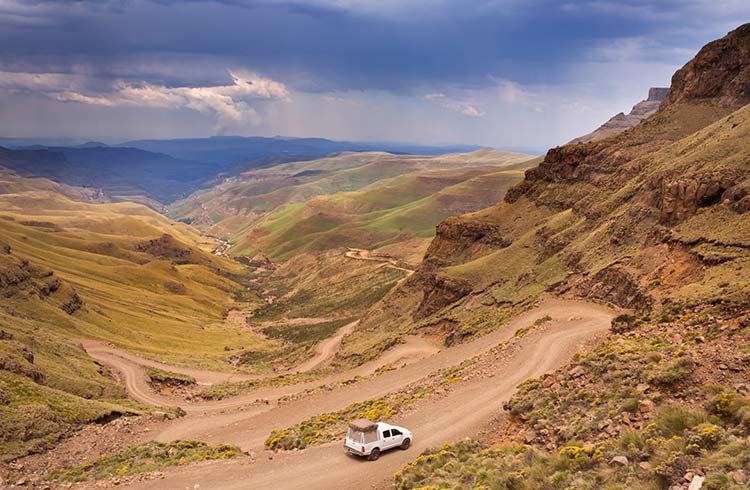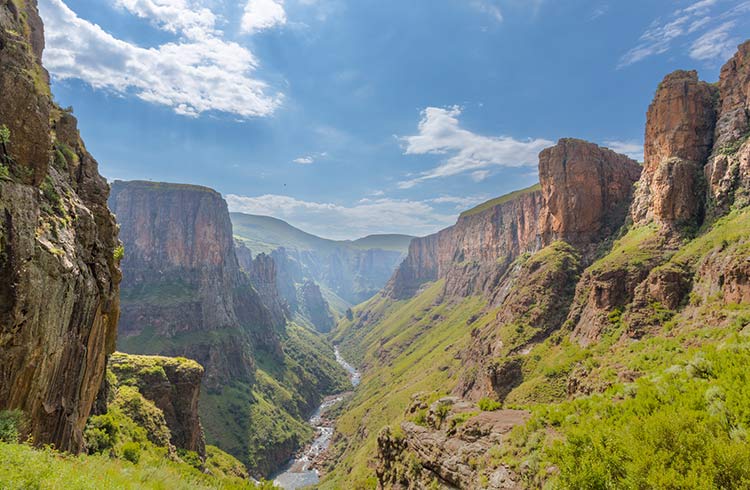Transport in Lesotho: Tips for Traveling Around Safely
Coronavirus (COVID-19) and travel: The situation around the world is changing dramatically. Various governments have changed their travel warnings to restrict travel during this time. To understand how this may impact cover under your policy, please go to our FAQs and select your country of residence.
For the latest travel warnings and alerts around the world, read about lockdowns and border restrictions.
Getting to isolated locations in Lesotho means braving some challenging roads and dodgy drivers. Here's what you need to know about safe transport options in Lesotho.
 Photo © Getty Images/sara_winter
Photo © Getty Images/sara_winter
Unspoiled landscapes, rugged mountain trails and rural retreats are the major drawcards for travelers to Lesotho. Unfortunately, getting to these isolated spots means braving some challenging roads and dodgy drivers.
For the most part major roads are well maintained and driving is safe, as long as you're careful. But there are definite risks involved in traversing the mountainous terrain that affect everyone.
Aside from Ethiopia, more people are killed on Lesotho's roads than any other African country.
So tighten your seat belt before you set off and keep your eyes peeled. If you need inspiration to stay alert, remember the country's previous king, the long-serving Moshoeshoe II who survived power grabs, a military coup and exile, eventually died in a car accident.
Renting a car
Many travelers to Lesotho will rent a car to make travel easier and more efficient. If you're traveling overland from South Africa you'll need to have a letter of permission from your rental company in order to enter Lesotho.
A 4x4 is recommended, although it isn't necessary to reach some of the more popular areas. Check the car is in good condition before leaving. Some of the rugged mountain roads can be quite punishing and you don't want to break down in the middle of nowhere.
Spare fuel, spare tyres and plenty of food and water are essential. Even if someone comes down whichever muddy trail you're stuck on, chances are they'll be on a horse and won't offer a particularly speedy solution.
A GPS navigation system can be very handy once you get outside the city and you should ask the rental company if they have any available.
Definitely test your car's headlights. There's no lighting on rural roads and pale headlights could lead to an unexpected and unpleasant plunge.
Registration is another issue, especially if you're coming from South Africa. Make sure it won't run out while you're in Lesotho because, although the SA police are quite a lenient on rego dates, the Lesotho Mounted Police Service (LMPS) is not. Your car's registration badge is the first thing they'll inspect at any checkpoints.
An international driver's permit isn't technically needed in Lesotho but they are cheap, easy to get and could save you some hassles.
Rocky roads in Lesotho
Lesotho's rugged geography means it's tough to build and maintain quality roads and the country's economic struggles don't make things easier. Roads in the cities and the major routes between them are paved and well maintained but once you get into the country, gravel and dirt are the norm.
The shared Highlands Water Project with South Africa has seen better roads built to service some of the dams and power stations but progress is slow.
As a starting rule you should try and organise to travel only during the day. Navigating steep sided, potholed mountain roads isn't easy at the best of times and doesn't get simpler in the dark.
The steep cliffs and mountains mean driving at dawn and dusk is tough as well because of the contrast between the shadowed roads and hills and the bright sun and sky.
The weather can change very rapidly, especially in Lesotho's highlands and sudden, intense rain can damage roads, loosen steep slopes and cause flooding in valleys.
Erosion is a major issue for Basotho farmers but also affects drivers. Rockslides are a constant hazard and it's not uncommon to turn a corner and come face to face with a car-sized boulder.
Be especially careful if you're driving after or during heavy or prolonged rainfall and try to stay abreast of weather reports before you set off.
Crazy drivers, kids and cattle
As tricky as the Lesotho landscape can be, it's a predictable threat and one that's easy to manage with the right planning and equipment. It's the unpredictable behaviour of the people and animals sharing the road that can turn your idyllic mountain drive into a nightmare.
Lesotho's drivers are often inexperienced and inconsiderate of other cars on the road. Officially the speed limit outside of cities is 100km/h but there's not a lot of uniformity of pace. Some cars scream past at warp speed, others crawl along in the middle of the road, spewing out smoke.
Drivers tend to change lanes suddenly and without warning, expecting other people on the road to react.
Minibuses, or kombis, are the main form of mass transport in Lesotho and they can be found careening all over the country. The drivers are reckless and keen to make good time, which often leads to disaster.
Beware of kombis pulling out without warning or stopping suddenly, especially in city streets.
Intoxication is a problem as well, especially on the weekends. Drunk drivers and drivers using dagga (marijuana) become even more prevalent around the last Friday of each month, payday in Lesotho.
You can't control other people on the road but you can account for them. Defensive driving is essential throughout Lesotho. Assume the worst of your fellow drivers, stay under the speed limit and maintain plenty of space between you and any nearby vehicle.
Things are likely to go wrong just as your attention wanders so make sure you're well rested before any long trips and take regular breaks along the way.
Pedestrians will walk out onto the road without looking both in the city and in rural areas. Be very aware of children hanging by the road in country towns. They often swamp tourists' cars and ask for sweets or money. Friendly and cute as they are, it's best not to give them anything. Doing so only reinforces the begging behaviour and puts them at risk down the track.
There are stories of spurned kids throwing stones at cars but this isn't a common occurrence.
Lesotho's livestock seems to have a very lacklustre understanding of road rules. Cattle, sheep and horses wander onto the road at random and can surprise unwary drivers. Younger animals are particularly skittish and unpredictable at the roadside and can bolt under your wheels even while they seem to be grazing quietly. It is particularly difficult to spot stray animals in low light, another reason to restrict your driving to the daytime.
If you do find yourself face-to-face with a frightened calf it's best to just plough on and then pay your respects. Swerving will likely send careening down the mountainside.
In the event of an accident in a rural area you should make restitution at the scene, especially if livestock is involved. Providing your insurance details isn't likely to placate an angry farmer.
If you're involved in a crash in the city, try and find a traffic cop as quickly as possible. Hand over your insurance details but don't flash cash about. Beware of crowds gathering at the scene of an accident and make a hasty exist if you feel the mood start to sour.
Lockdown
Carjacking is a threat, more in Lesotho's cities but gangs have been known to stop slow-moving cars on tough rural roads as well.
Keep your windows rolled up and doors locked at all times when driving through populated areas.
Be alert at intersections, particularly in Maseru, and always leave a little wriggle room between you and the car in front so you can escape if you feel under threat.
Don't leave anything of value visible when parking your car. Try and leave it in a busy, well-lit spot if possible
Driving in Lesotho is a calculated risk but one you can manage with the right information and a cautious approach. Behind the steering wheel you have at least some control over your destiny, which is more than can be said for some kombi rides.
Get a travel insurance quote for Lesotho
You can buy at home or while traveling, and claim online from anywhere in the world. With 150+ adventure activities covered and 24/7 emergency assistance.
Related articles
Simple and flexible travel insurance
You can buy at home or while traveling, and claim online from anywhere in the world. With 150+ adventure activities covered and 24/7 emergency assistance.
Get a quote
1 Comment
I really needed this information. Thank you